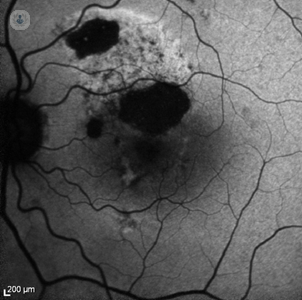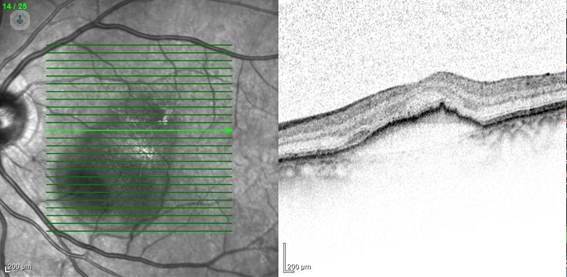Key Concepts on Macular Degeneration Age
Written by:The macular degeneration (AMD) is a degenerative eye disease that affects an area of the retina, the macula. This is directly responsible for central vision necessary for everyday activities like reading, driving or identify individuals.
Macular diseases are responsible for more than 50% of vision loss occurring in the developed world. AMD is the most common cause of legal blindness in people over 50 years in Western countries.
The prevalence of AMD increases from 0.5% at 60 years to 10% from 80 years and the World Health Organization (WHO) expects its incidence to triple in the coming decades.
Types of DMAE
- Dry or atrophic: The most common. It occurs in 80 or even 90% of cases and is characterized by a very slow vision loss. Currently no treatment available for use in clinical practice. Although soon we will have the first treatment for this type of AMD.

- Wet or exudative: It is less common, since only occurs in 20% of cases, but is more severe because the loss of vision is rapid. It is by intraocular injections inhibiting drugs vascular endothelial growth factor.
Risk factors associated to DMAE
- Age is the most important. The older the higher prevalence of the disease.
- Genetic factors: It is not the main factor, but it has shown its relationship with the onset of the disease.
- Snuff: is the only modifiable risk factor. It is very important that the patient does not smoke.
- Deficit of nutrients and anti-oxidants: We have already discussed in another article the importance of healthy nutrition and the role of antioxidants, especially the omega-3 acid in the prevention of wet AMD.
The availability of useful methods for early diagnosis, such as optical coherence tomography (OCT), and effective therapies such as growth factor inhibitors of vascular endothelium to slow the progression of wet AMD towards progressive blindness; can expect improvements in the natural history of AMD and quality of life of patients, but increasingly preventive measures such as not smoking or control hypertension and obesity become more important.

How do I know if I have AMD?
Early symptoms of AMD can be distorted vision of straight lines or perception of a dark spot in the center of the field of view. The most important thing is the realization of a complete eye examination with dilated pupils and Fundus examination by an ophthalmologist expert. Your eye doctor can explain and guide the diagnosis, monitoring and possible treatment if necessary.
Key concepts to remember DMAE
- There may be no symptoms at the onset of the disease.
- There are effective treatments.
- The snuff increases the risk of AMD.
- Proper nutrition can slow the progression of the disease.
- Early diagnosis, with a full ophthalmologic examination, should start from 40 years of age.



